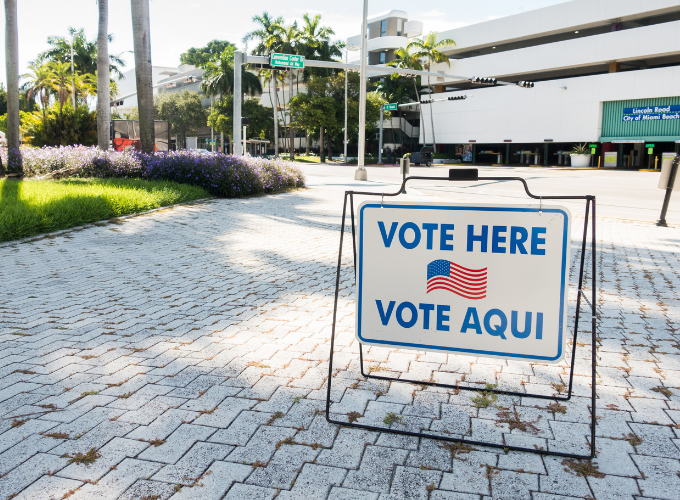The 2024 Election and the Hispanic Voter Advertising Gap: What We Learned

Last fall, Optimum Media conducted a swing-state voter survey through our proprietary mobile advertising product, AdMessenger. One of the biggest takeaways: Hispanic adults were significantly underserved by political advertising in the 2024 election. Our study showed a striking gap in targeted outreach, particularly in swing states where every vote counted.
Some Takeaways
Our research revealed that Hispanic adults were 50% less likely to have encountered helpful political ads than the general population. This means that crucial information about candidates, policies, and voting logistics was not reaching a key segment of the electorate at the rate it should have.
Digging deeper, we found that Hispanic men aged 35 and older were 40% less likely to report seeing a helpful ad, while Hispanic women faced a similar 40% gap. These findings suggest an overall shortfall in effectively engaging Hispanic voters with relevant and resonant messaging.
How This May Have Impacted the 2024 Election
The consequences of this gap were felt most acutely in swing states, where Hispanic voters played a pivotal role in determining outcomes. The lack of effective advertising meant that campaigns missed opportunities to connect with these voters on the issues that mattered most to them.
The eligible Hispanic voter population was projected at 36.2 million in 2024, up over 12% from 2020 and representing 50% of the total growth in eligible voters. In states like Arizona, Nevada, Pennsylvania, and Georgia, where Hispanic voter turnout has steadily increased, deeper targeted outreach could have made an even more significant impact. Instead, as our study showed, many Hispanic voters reported a lack of helpful ads, and campaigns may have struggled to mobilize key voting blocs, ultimately influencing election results in unpredictable ways.
Refining Strategies for Future Campaigns
Our study highlighted opportunities to refine outreach strategies when engaging Hispanic voters and multicultural audiences in general.
- Culturally Relevant Messaging: Campaigns must ensure ad content speaks directly to Hispanic audiences in a way that resonates with their values and concerns as it differs by generation, country of origin, and cultural background.
How we’d do it:- Our strategists thoughtfully decide when to use Spanish, English, or Spanglish to connect with diverse Hispanic audiences. But beyond that, businesses must go further than language and delve into the heart of Hispanics’ unique cultures and traditions because the country of origin does matter.
- By leveraging our various data sources, we can move beyond a generic “Hispanic” audience segment to build lookalike audiences based on language preferences, viewership, voting, and online behaviors. This is essential to refining targeting strategies and expanding reach beyond the traditional model.
- Multiplatform Approaches: While television remains the most preferred device for video streaming, nearly 31% of Hispanics prefer mobile video streaming, a 169% increase over non-Hispanic audiences.
How we’d do it:- Expand beyond traditional media and leverage streaming and other digital platforms to reach Hispanic and other multicultural voters where they are most active.
- Hispanic audiences exhibit mobile-first behavior, so you must utilize multiple touchpoints to reach Hispanic voters as they go throughout the day. By focusing on a mobile-first platform like our proprietary solution, AdMessenger, you can layer highly targeted CTV for a strategic multiscreen approach.
- Avoid overspending on broad broadcast TV buys, as they may not effectively reach Hispanic voters compared to more targeted digital and streaming approaches.
- Localized Content: Addressing regional issues most relevant to Hispanic communities.
How we’d do it:- Use hyper-targeting at the local level to isolate and engage different Hispanic/Latino communities based on their unique cultural values and key concerns.
- We know voters’ priorities will differ by generation, country of origin, and cultural background -- and how campaigns speak to voters should match. By crafting different content for Cuban American neighborhoods versus Puerto Rican communities, you ensure we don’t treat Hispanic voters as a monolith.
Of course, one of the most effective ways is to ensure that Hispanic perspectives are present at the table when developing campaign strategies and messaging.
The 2024 election highlighted a clear gap in effectively reaching Hispanic voters through advertising. As political and public affairs campaigns prepare for the future, understanding how different demographics engage with political messaging can help ensure that all voters can access the information they need to make informed decisions at the ballot box.
Our Data-Driven Strategies
Fortunately, our Optimum Media political and public affairs team shines in this area. Our precise validation, strategic partnerships, and innovative methods help us better understand audiences and improve our clients’ targeting strategies.
For example, while English-dominant Hispanics only make up 4% of Pennsylvania’s total voting population, their usage reveals opportunities for voter engagement. Our data shows these households are highly engaged with streaming platforms, watching over 42 hours of YouTube, 18 hours of Philo, and nearly nine hours of Pluto TV each month. But their interests don’t stop there -- these voters are 156% more likely to follow NBC Sports Regional and 55% more likely to tune into Telemundo every month.
Understanding these viewing patterns isn’t just about knowing what Hispanics watch -- it’s about leveraging these insights to craft smarter, data-driven voter outreach strategies. By meeting audiences where they are, campaigns can connect with key demographics in ways that truly resonate.
Are you interested in learning more about our insights and targeted data-driven strategies? We’d love to brainstorm a cross-platform strategy and help tailor recommendations to your campaign’s target audience. Contact us to learn more.
This article was written by McKinley Williamson and Jenna Walker
Posted at MediaVillage through the Thought Leadership self-publishing platform.
Click the social buttons to share this story with colleagues and friends.
The opinions expressed here are the author's views and do not necessarily represent the views of MediaVillage.org/MyersBizNet.

